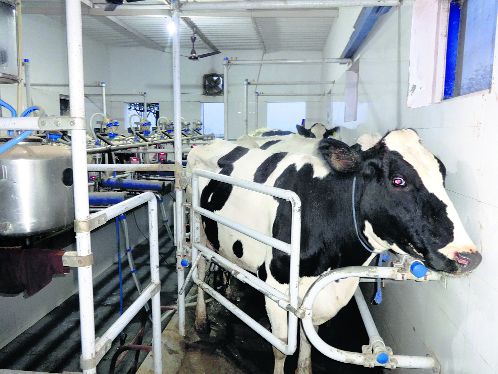
File photo
Inderpreet Kaur & Pranav K Singh
The spread of Covid-19 has forced the country to go under lockdown. All businesses in Punjab have taken a hit, including the dairy sector. Only essential commodities, including milk, are allowed to be home-delivered. However, the domestic consumption of milk has been disrupted by the curfew in Punjab. Mainly due to the closure of commercial outlets, the demand for milk has seen a drastic fall.
More than 70 per cent of milk is being produced by small farmers; milk provides immediate cash for their livelihood. These small farmers are worst hit due to lower demand and consequently no/partial procurement. The major share of milk is handled by the unorganised sector comprising milkmen, milk contractors, halwai shops/ creameries/city-based private dairy shops etc., while only 30 per cent is handled by the organised sector — dairy cooperatives and private milk plants. Milk is a perishable product and it can’t be stored without proper processing. That is why reports of dumping of fresh milk by farmers are coming in from different parts of the world. In the Indian dairy sector, milk is collected twice a day (morning and evening), unlike the developed countries where it is stored in silos at dairy farms and collected by dairy plants on a weekly or biweekly basis. With the drop in milk demand, the sale of dairy products, particularly value-added products, has also gone down. Private plants which are mainly involved in the production of value-added dairy products are witnessing a major liquidity crisis.
Punjab has the highest per capita milk availability in the country. It accounts for around 6.7 per cent of the total national milk production. It has 10 milk plants in the cooperative sector with a total installed capacity of around 20 lakh litres per day. However, current daily milk procurement is 26.5 lakh litres per day (as on April 1, 2020) which is around 32 per cent higher than their installed capacity. It’s tough for dairies around the country to handle a surge in fresh milk supply on the one hand and a concurrent major drop in demand for milk and milk products on the other.
Usually, when there is greater availability of liquid milk, extra milk is converted by dairy plants into skimmed milk powder (SMP) to meet the peak demand in the summer season. However, mainly due to the liquidity crisis and limitation of working capital, dairy plants cannot afford to manage delivery of surplus milk. Punjab has one of the strongest networks of milk procurement by organised sector players like Verka, Nestle, Amul, Nutricia, True Milk, Metro Dairy etc., but still dairy farmers are finding it difficult to dispose of their milk. Some milk plants are accepting the milk from farmers on the condition of deferred payment, while other plants have started practising a weekly milk holiday — no milk collection on that particular day. Difficulties are also arising in fixing milk prices. There is a fall in milk prices and farmers may be disposing the milk at a price lower than the cost of production.
Punjab has 32 lakh households, of which about 14 lakh are rearing cattle. It is imperative for the government to come up with measures to bail out the dairy sector. The government can ensure hassle-free availability of easy credit through banks to meet the working capital requirements of dairy plants. If required, provision of granting loan against the stock of SMP/butter/ghee (long shelf life products) could be a good proposition for the banks. The government can streamline doorstep delivery of milk. It can consider allowing the opening of halwai shops/creameries for a few hours daily, provided social distancing norms are observed. Under the free ration scheme being undertaken by the government during lockdown, milk packets can be included. Dairy farmers and plants can convert milk into ghee and other products which have a longer shelf life.
— The authors are livestock economist and dairy technologist, Guru Angad Dev Veterinary and Animal Sciences University, Ludhiana. Views are personal.
Join Whatsapp Channel of The Tribune for latest updates.



























